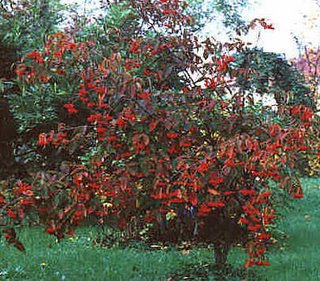Tea Viburnum - Monday garden blogging 2
 Another image taken elsewhere that conveys very accurately the look of a plant growing in my garden. Some years the leaves of the tea viburnum (Viburnum setigerum) turn the smoky red seen here; in others -- I'm looking at you, 2005 -- they just blacken before falling. The reason for growing the shrub is its bright red fruits, which stay red and hang on long past leaf fall, deep into winter.
Another image taken elsewhere that conveys very accurately the look of a plant growing in my garden. Some years the leaves of the tea viburnum (Viburnum setigerum) turn the smoky red seen here; in others -- I'm looking at you, 2005 -- they just blacken before falling. The reason for growing the shrub is its bright red fruits, which stay red and hang on long past leaf fall, deep into winter. There are many native viburnums with similar-looking fruits, but birds eat them almost as soon as they color. By the time the leaves have fallen, those berries are long gone. Tea viburnum is native to China. Maybe Chinese birds eat the berries; here, I've watched mockingbirds try them and immediately spit them out, shaking their heads in disgust. Many shrubs' fruits need repeated freezes to make them palatable, which helps assure that some food is available for birds in the more desperate winter months. Nothing seems to render the tea viburnum's bright red raisins edible, though.
This quality allows the shrub to put on a show when there's no other color at all. A tea viburnum in mid-December, seen against an early dusting of snow, is the essence of the winter solstice.
Viburnums are almost all tough, resilient plants. V. setigerum is adaptable to sun or part shade. It's thrived in heavy clay here, but would probably be even happier in more well-drained soil, barring drought. The only work required is pruning for shape after the first couple of seasons; it tends to get leggy and send up gaunt, sucker-like shoots that should be cut off at the base. In its eleventh season, my tea viburnum seems nearly full grown at 7-8 feet tall. It's stopped sending up rangy shoots. The berry show is the best ever, almost enough to have me wishing for a grey day in December.
Labels: garden


